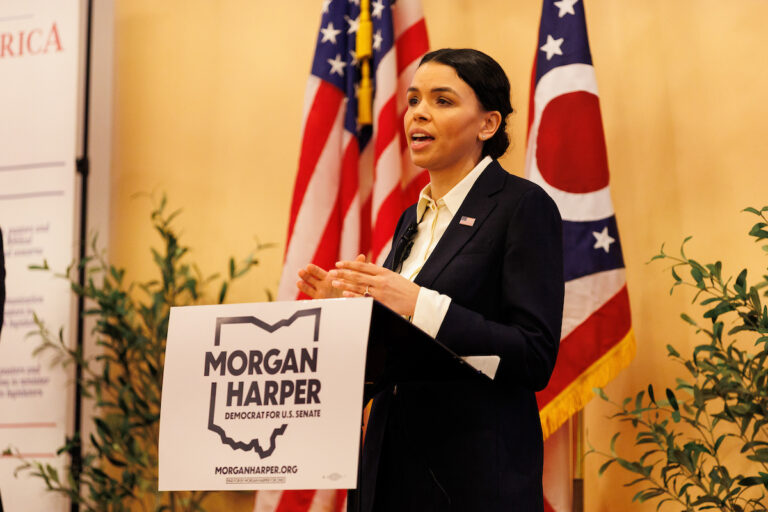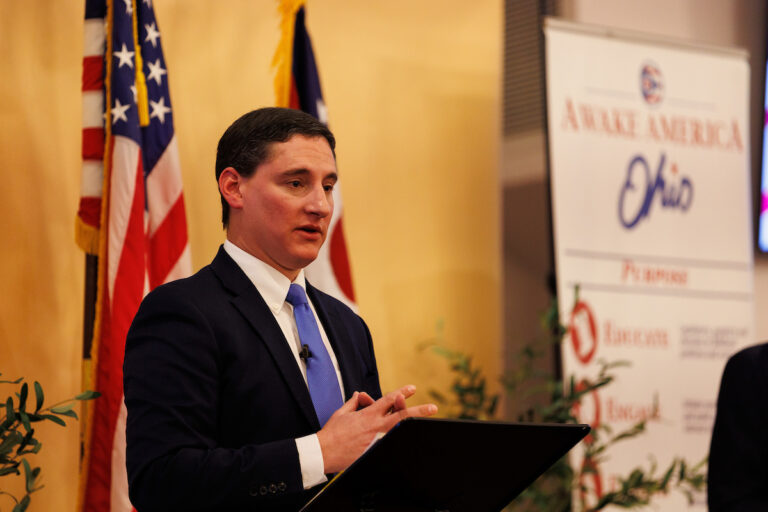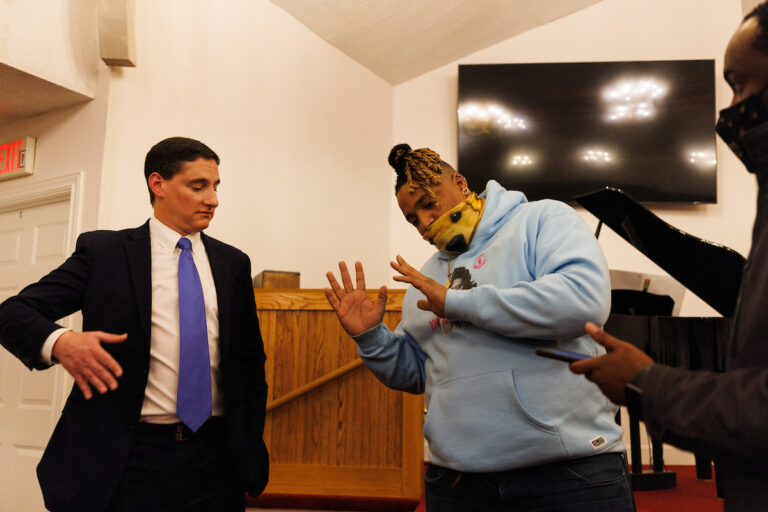In unprecedented move, primary contenders from Democratic and Republican parties hold debate
BY NICK EVANS
Pastor Dan Wolvin flipped a coin to decide the order of speakers. His church, North Columbus Baptist hosted a debate Thursday night between Ohio U.S. Senate candidates Morgan Harper and Josh Mandel. The pastor did the honors with a U.S. Supreme Court challenge coin — got it at the gift shop. When it landed on the dark red carpeted stage the building’s columned façade stared back: tails. Harper’s team won and decided to speak last. Mandel got to give his opening statement first.
About 50 people attended the event, packing themselves into rows of dark red pews. Wolvin cracked, “Please have the offering baskets ready tonight,” as the audience settled into their seats. His wife Denise described her politics as making Rush Limbaugh look liberal in comparison, but she came anyway hoping to hear both sides.
“I’m just hoping to hear a clear message from both of them so we can make clear choices,” she said.
The event offered a notably odd couple — long shot progressive paired with conservative bomb thrower. Harper, a Democrat, has spent recent months criticizing her primary opponent Rep. Tim Ryan, D-Niles, for refusing thus far to agree to a debate. Mandel, a Republican, has participated in a handful of townhalls with the rest of the GOP field, and he was quick to take up Harper’s frustrations. In his opening statement, Mandel called Ryan a “wimp” for refusing to debate Harper and suggested he would’ve done so already if Harper were a white man.
The debate, moderated by Pastor Wolvin and Cassie Young from Matter News,’ covered a broad array of issues from crypto to climate change and the filibuster to foreign policy. In nearly every response the candidates’ drastically divergent world views were thrown into sharp relief.

On a question about rising inequality, Mandel offered a story about pregnant nurse advised by her doctor not to get vaccinated because of two previous miscarriages who was facing vaccination mandate from her employer.
“The most important thing we can do to protect people’s jobs is give them the freedom to decide whether or not they have a vaccine,” Mandel argued.
It is worth noting vaccination mandates typically include medical exemptions.
Harper meanwhile, addressed economic inequality head on, arguing for investments in the renewable energy sector, debt free job training for the field, and universal health care. She then pivoted back to the pandemic, comparing Mandel burning masks on Twitter with her work through Columbus Stand Up, distributing masks and helping transport people to the polls or vaccine clinics.
“That’s what service looks like, that’s the type of leadership that Ohio deserves in the United States Senate.”
On climate change, Harper reiterated her point that with the right investments, renewable energy represents an enormous opportunity to establish a stable industry with high paying jobs. Mandel dismissed this.
“Ladies and gents, Morgan is running for U.S. Senate in Ohio, not in California,” he said, before arguing that taken together, Ohio, Pennsylvania and West Virginia would constitute the third largest producer of natural gas in the world.
“There are hundreds of thousands of jobs buried in the ground,” he said. “Morgan Harper, Joe Biden, Nancy Pelosi, Chuck Schumer — they want to keep those jobs buried in the ground.”
Mandel said he relishes his status as an “outsider” — though he has been twice elected as Ohio Treasurer and was previously an Ohio House representative — and said it’s part of why he’s built his campaign around churches rather than the typical party apparatus. And he argued he would set records in earning Black support, because, he said, establishment politicians take the community for granted.
“I’m going to take a message to the Black community about why moms and dads should have a choice where their kids go to school,” Mandel said. “I’m going to take a message to the Black community about why freedom and liberty and parental control of our kids is the right way, not in government control of our kids.”

Baffled, Harper retorted, “What we don’t need to have happen is Josh Mandel’s speaking in any way for the Black community. And I think what the Black community of Ohio knows very clearly, is that the radical Republican party that’s trying to strip away our voting rights, does not have our best interests at mind.”
And on the issue of voting rights, she’s correct. Later in the evening Mandel staked out a maximalist position on the issue — not just ‘no’ on the John Lewis Voting Rights Act and other Senate legislation, but also no voting machines, no early voting, and no ballot without a first showing a photo ID. He also took the chance to reiterate the lie that the 2020 election was stolen.
Harper argued “real” Ohioans are concerned about hour long lines to vote and having a single ballot drop box in a county of 2 million people. She voiced support for Senate measures protecting voting rights and putting the brakes on partisan gerrymandering.
“Let’s remind ourselves why we’ve gotten to this place,” Harper said. “It’s because one party feels like it has to cheat in order to win and try to deny Black people the right to vote in order to get enough votes for themselves. We see through what’s happening. And my opponent and his entire party has gotten us to this place to threaten our entire democracy.”
Turning to the big lie, Harper said it’s only a bid to earn Trump’s endorsement and criticized Mandel for maintaining the rhetoric that left law enforcement officers dead on Jan. 6, 2021.
The topic of qualified immunity presented another crack in Mandel’s outreach to Black voters. After insisting that the legal protection for officers who injure or kill people in the line of duty be maintained, Mandel turned to a denunciation of the Black Lives Matter movement, repeatedly calling demonstrators “thugs.” There were more than a few grumbles from the audience and at least one invoked Jan. 6.
Harper took the opposite position on the issue, arguing it was a matter of fundamental fairness.
“We have incidents of bad actors who are supposed to be protecting safety, but actually are not doing that, and there results in, at times, a loss of life. And when those incidents occurs, there needs to be accountability. Just like when all of us break the law that type of accountability exists.

(Photo by Graham Stokes for Ohio Capital Journal)
After the debate concluded, Julian Mack, an organizer from Toledo, approached Mandel urging him not to use the term thugs to describe protesters.
“There’s things we disagree on, but you don’t have to reinforce those racist tropes,” he said. “That brings out the worst of us, that brings out the worst aspects of this country.”
Mandel argued back that protesters damaging his friend’s apartment is “the definition of thuggery.”
After arguing in circles for a few minutes, Mack walked away, asking Mandel to at least think about what he’d told him.
Afterward, Mack was disappointed that even speaking one-on-one it didn’t seem like Mandel was really hearing him.
“If I’m saying, look, this is disrespectful, right? Hear me. Understand where I’m coming from. This is a toxic trope that has existed for too long,” Mack said. “Somebody needed to tell him, you know. And I tried to do so in the most respectful manner possible.”
***
Also from Ohio Capital Journal:
Legislature on the clock to redraw Ohio’s unconstitutional Congressional district map
As the state awaits the Ohio Supreme Court’s decision on the second round of legislative maps, the state legislature is on a timeline to revise the invalid congressional map as well.
The state’s high court decided in a 4-3 decision on Jan. 13 that a congressional map passed by the General Assembly was not valid, in the same way they’d ruled the legislative maps were invalid: undue partisanship.
While in some cases, courts can rule that certain parts of a redistricting plan have “isolated defects,” the state supreme court said in its majority opinion that there were systemic flaws “such that constitutional defects in the drawing of some district boundaries have a consequential effect on the district boundaries of other contiguous districts,” so no one solution would fix the problems.
“In this case, the partisan gerrymandering used to generate the 2021 congressional-district plan, through undue party favoritism and/or undue governmental-unit splits, extends from one end of the state to the other,” Justice Michael Donnelly wrote for the majority.
In rejecting the map on Jan. 13, the court set a 30-day deadline for the state legislature to come up with a different plan, one that complied with all the of the constitutional rules, including Section 6, which prohibits the state congressional (and legislative) map from unduly favoring one political party over another.
Multiple members of the state legislature told the OCJ they haven’t received any directives or been in discussion with other legislators about when or if the General Assembly will discuss redistricting before the 30-day deadline expires. READ MORE
Ohio leads nation in COVID-19 deaths over last week
Ohio led the nation in COVID-19 deaths over the last seven days.
The finding, per a New York Times tracker of federal data, belies the good news that infections and hospitalizations caused by the new coronavirus have trended downward over the course of the first month of 2022 in Ohio and around the U.S.
Death data tends to lag infections and other pandemic indicators by three to four weeks, leaving the current picture somewhat hazy. In December 2021, more than 105 Ohioans died on average of COVID-19 per day.
While hospitalizations and infections are waning, they continue to occur at some of the highest rates of the pandemic. More than 13,000 Ohioans on average are contracting COVID-19 per day, according to an analysis of state data. More than 230 per day are admitted into hospitals with COVID-19. Nearly 4,750 Ohioans are currently hospitalized with COVID-19, according to the Ohio Hospital Association.
“It’s a real mixed bag and I think that gets lost in this desire to find the positive news,” said Mark Cameron, an immunologist at Case Western Reserve University. “That basically undermines the severity of what some people are going through right now, and the continued need for precautions.” READ MORE

